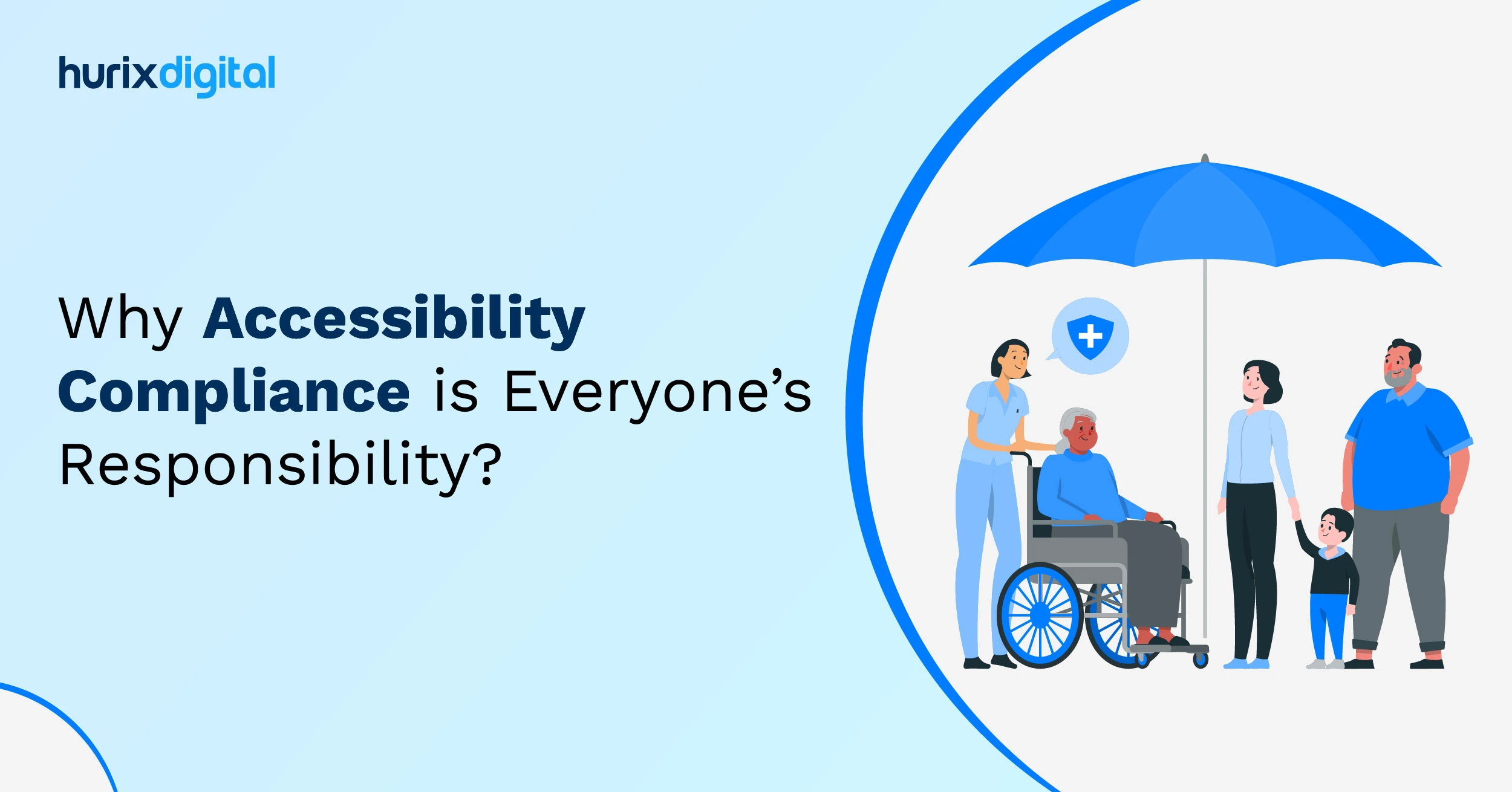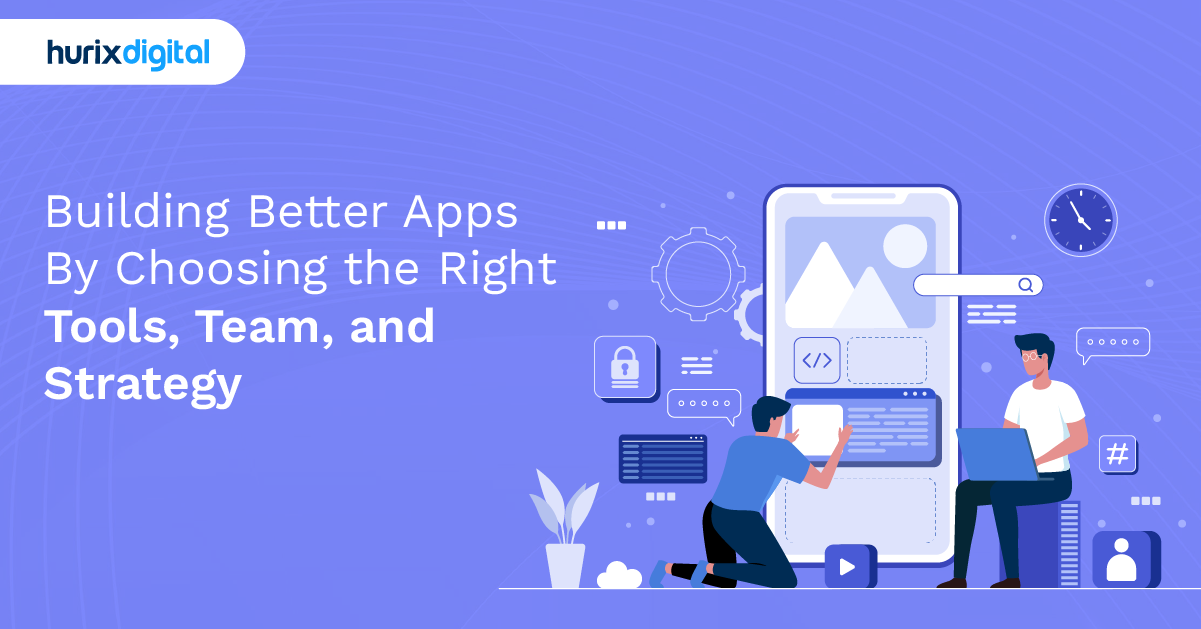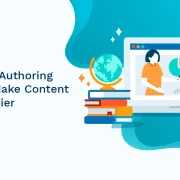
The App Developer’s Playbook for Mastering Mobile App Development
Mobile App Development has evolved into an essential aspect of our daily existence. We use apps to serve all our needs – communicating, shopping, finances, entertainment, and much more. With endless apps populating application stores, succeeding is a difficult task. For a business aiming to construct a triumphant mobile app, the crux should be crafting an unparalleled user experience that resolves a specific demand or provides singular value.
The core functionalities and attributes incorporated into your app will determine its success or failure. This blog is an all-purpose guide to making better apps!
Table of Contents:
- 5 Key Challenges in Enterprise Mobile App Development
- Snapshot of Solutions to Explore
- Leverage an App-Development Platform
- Partner with an Agile Enterprise App Development Company
- Intuitive User Interface and Design
- Blazing Fast Performance
- Offline Capabilities
- Simplified Onboarding
- Social Integration
- Push Notifications
- Gesture Controls
- Biometric Authentication
- Geolocation
- Analytics Integration
- Bonus Features
- Top 5 Tools to Improve Your App Development Efficiency
- Looking to Make Better Apps? Key Reasons to Hire Top Mobile App Development Companies
- Types of Mobile App Development Firms
- Metrics to Consider When Choosing the Top Mobile App Development Companies
- Crucial Phases in Hiring Top Mobile App Development Companies
- To Wrap Up
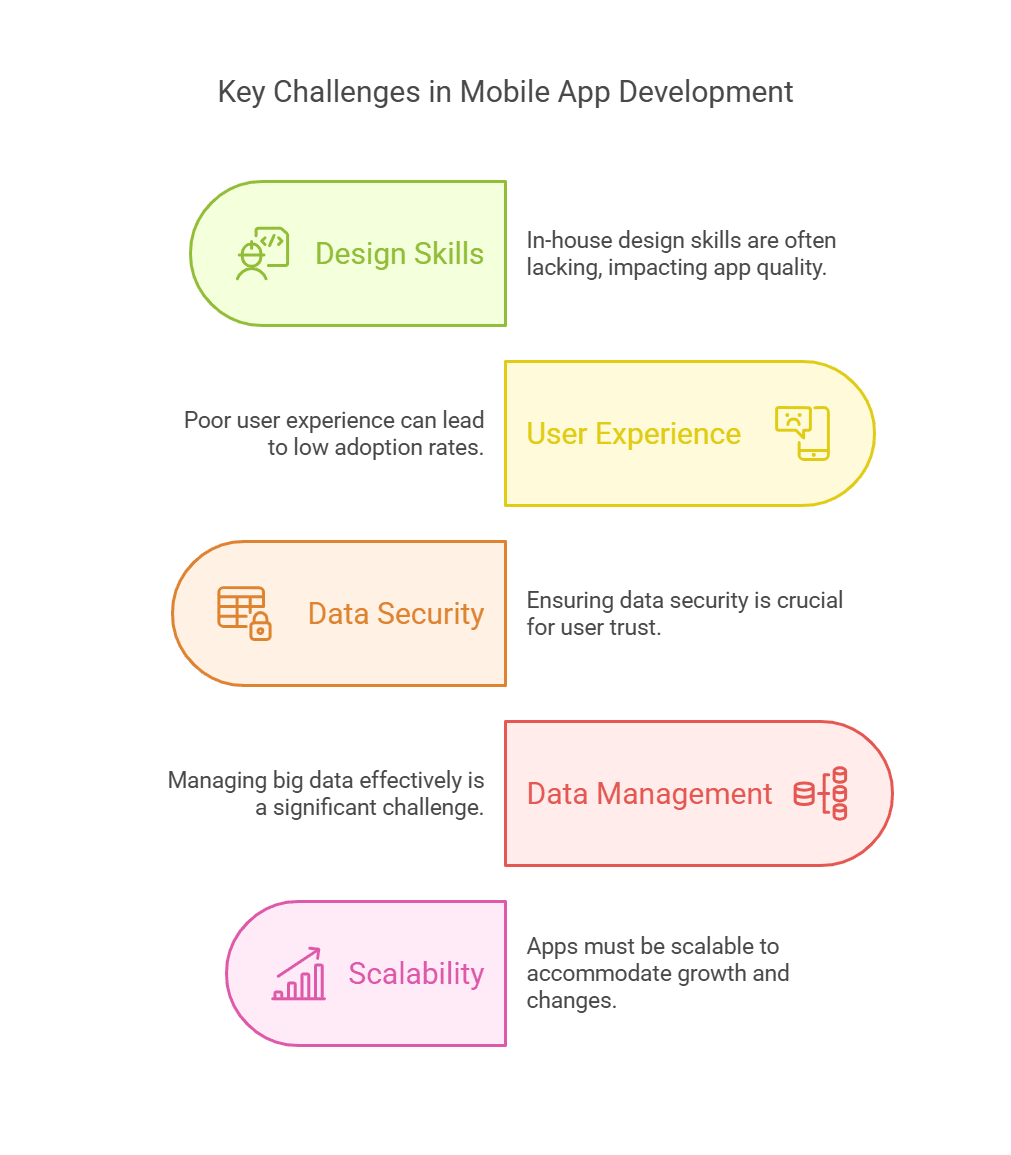
5 Key Challenges in Enterprise Mobile App Development
Here’s a snapshot of five common difficulties faced by businesses when developing a superior enterprise mobile app.
1. Lack of In-House App Design Skills
Businesses may need more resources to undertake an enterprise mobile app design project, which requires very specific skills. Hiring a team from scratch is an expensive undertaking.
Redeploying in-house technology talent with generic skills can lead to the creation of a sub-standard product. In-house teams only work if they have the skills and bandwidth to deliver.
2. Poor User Experience
B2B audiences expect a superior user experience, just like consumer tech apps. If the user experience of an enterprise app is not seamless, it can lead to a breakdown in business processes.
Building a seamless user experience that is intuitive to a user’s needs is a key challenge for app development teams. It requires superior UX design skills and an in-depth understanding of the user’s needs to build a superior experience.
3. Lack of Data Security
Data security is one of the most important features of any world-class enterprise app because such apps generate large volumes of sensitive user data.
Data types include identity details, financial data, and medical information, to name a few. As the risks of cyber-attacks grow, ensuring that data is secure and not susceptible to such attacks is becoming more challenging.
4. Big Data Storage and Management
Enterprise apps generate massive amounts of data every day, which need to be processed and stored securely. Businesses must make provisions to store data on a secure server.
Purchasing and maintaining servers is an expensive undertaking. Hence, businesses need to identify inexpensive means to process and store data, which is only going to increase in volume over time.
5. Continuity and Scalability
Developing and maintaining a world-class app is a continuous process. However, businesses find it challenging to continue the upkeep and innovation of apps that may be launched with enthusiasm.
An enterprise app must be continually tuned into the user’s journey, needs, and challenges. It needs ongoing innovation to address these elements while also being able to scale without crashing as the number of users grows.
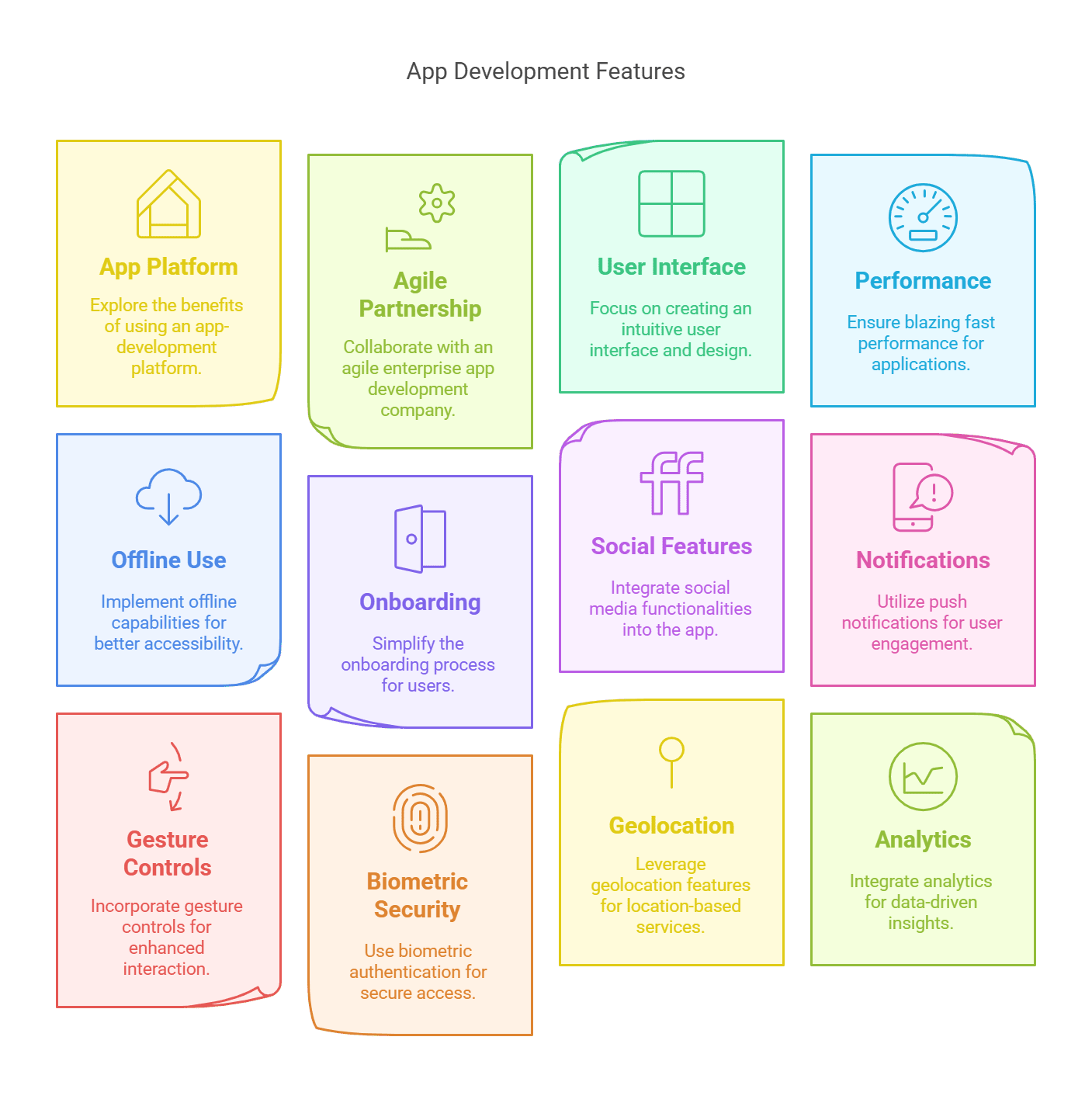
Snapshot of Solutions to Explore
Follow the strategies mentioned below to address the challenges effectively and ensure the successful development of your enterprise mobile app:
1. Leverage an App-Development Platform
Businesses looking to build their enterprises in-house can leverage an app development platform. Popular platforms include Android Studio, which offers tools and access to the newest Android features, and Xcode, which enables the design of apps for the iOS ecosystem.
However, most businesses today want to develop mobile enterprise application platforms that can be used across Android, iOS, and other operating systems.
Here are some examples of cross-platform options:
- React Native: Enables quick development and deployment across platforms using JavaScript and React.
- Flutter: This is Google’s framework, which utilizes Dart to build visually appealing, higher-performance apps for Android and iOS.
- Xamarin: This Microsoft-backed platform uses C# for development and helps build apps with a strong, good performance and a native-like feel.
While such platforms simplify the process of developing an enterprise app, in-house teams must have the app development skills and bandwidth to make it a user-friendly product with long-term value.
2. Partner with an Agile Enterprise App Development Company
Outsourcing the entire app development process to a specialist that offers an enterprise app development service can be a cost-effective solution for businesses.
Here are some key attributes to seek in a potential partner:
- Expertise: The app development team must have the skills to build a world-class enterprise app. These include all aspects of UX design, product management, and quality testing.
- Experience: Check for a proven track record of building superior enterprise apps for other businesses.
- Development Approach: App development teams must leverage agile, which allows for superior collaboration and adaptability as business goals evolve.
- A Transparent Framework: Mobile app development partners must establish a framework for transparency and communication throughout the project.
- Affordability: Ensure that the pricing model matches your budget. Account for how aspects such as development delays will impact the budget.
3. Intuitive User Interface and Design
A meticulously crafted interface with seamless navigation is essential for positive user engagement. Employ a user-focused design that emphasizes simplicity and ease of use. Incorporate established UI patterns and elements that feel innate to users. Guarantee all calls-to-action and vital functions are readily accessible.
Thoroughly assess information architecture and eliminate intricacy. Responsive design for optimal viewing across device sizes is prudent. Choose fonts, color schemes, and layouts judiciously for aesthetics and scannability. Comprehensive testing before launch across devices is advisable. Apps with refined and seamless UIs benefit from higher user retention and satisfaction.
4. Blazing Fast Performance
Lethargic apps are a major annoyance for users. Your app should load swiftly and respond instantaneously to input. Optimize images, and scripts, leverage caching, minimize API calls, test on subpar networks, and profile CPU usage to pinpoint and rectify bottlenecks. Employ tools to benchmark speeds.
Implement lazy loading, compression, and code splitting. Avoid janky animations and long main thread tasks. Move expensive operations to web workers. Over half of users will abandon an app after a mere 3 seconds of lag. Constructing nimble, quick apps results in superior engagement.
5. Offline Capabilities
Permitting some core functionality without internet access enhances reliability. Employ a local database and background syncing to keep data current. Enable users to draft content, queue requests, bookmark, etc. while offline to avoid disappointment. Consider using progressive web apps with service workers for basic offline support. Save user actions locally and sync post reconnection. Provide clear messaging when offline capabilities are limited. Seamless offline handling provides uninterrupted usage.
6. Simplified Onboarding
Avoid unnecessary steps or fields in your signup process. Incorporate single sign-on options like social logins for convenience. Subtly verify emails via magic links. Include a brief tutorial showcasing your app’s value proposition and highlights. Personalize for returning users. Use animations and tooltips to demonstrate flows.
Allow easy skipping to revisit later. Research reveals that over a quarter of users abandon apps after initial use due to convoluted onboarding. Smooth onboarding equals higher conversions.
7. Social Integration
Incorporate native social sharing capabilities via SDKs of leading platforms. Allow straightforward content sharing to popular social sites. Implement social login for convenience. Enable users to invite friends, earn rewards, and unlock features via social sharing. Enrich sharing with preview images and captions. Add social follow buttons and curate comment feeds. Social virality can skyrocket adoption and bolster retention.
8. Push Notifications
Well-timed and contextual push notifications maintain user interest and drive re-engagement. Send targeted updates about new features, content, events, etc. Trigger location and behavior-based prompts like checkout reminders. Judiciously schedule campaigns and onboarding drip sequences.
Personalize notification content based on user attributes. Allow granular notification preferences. Incorporate rich media in notifications when relevant. Ensure notifications are non-intrusive and deliver value. Push messages boast open rates as high as 40% versus 20% for email.
9. Gesture Controls
Leverage swipe, tap, force touch, and other gestures to enrich interactions. Cater to one-handed use, especially on large screens. Enable gestures as shortcuts for frequent actions. Provide in-app feedback on supported gestures. Incorporate peek-and-pop interactions on 3D touch-enabled devices. Leverage gyroscope and accelerometer for immersive experiences. Gestures produce an intuitive native-app feel that users appreciate.
10. Biometric Authentication
Employ device biometrics for seamless yet secure login and payments. Fingerprint, facial recognition, and touch ID integration enable password-less convenience that promotes habit-forming usage. Support Android and Apple biometric APIs. Inform users of availability during onboarding. Store credentials securely leveraging platform keychains. Biometrics augment security and boost conversions for transactions.
11. Geolocation
Responsibly access location data to provide contextual experiences and geotargeted features. Construct location-aware capabilities like store/event finders. Geotag content and tailor feeds by location. Trigger proximity-based notifications and prompts. Implement geofencing for relevant check-ins. Display maps and directions to nearby points of interest. Monitor and minimize user location data appropriately. Location boosts daily utility.
12. Analytics Integration
Sophisticated analytics is indispensable to refine apps continually post-launch. Incorporate tools to quantify engagement levels, and analyze flows, funnels, churn, cohorts etc. Define custom goals and events to track. Gauge adoption, retention, and usage metrics. Capture errors and monitor performance. Relentlessly optimize user experience guided by data insights. Analytics-driven development enables construction apps users to admire.
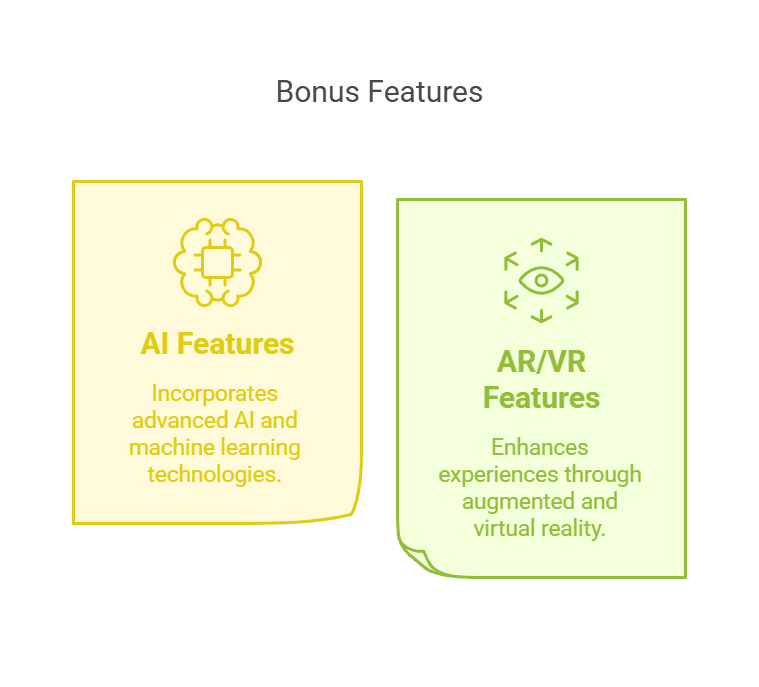
Bonus Features
1. AI and Machine Learning
AI and ML empower intelligent experiences. They recommend customized content and products based on user preferences, enable smart search and predictive input, implement chatbots for conversational interfaces, analyze images and text using computer vision and NLP, and personalize messaging with ML. AI/ML elevates apps with cutting-edge functionality.
2. AR and VR
Mobile AR/VR unlocks immersive new capabilities. Incorporate AR libraries to overlay digital content on real-world camera views. Create 3D VR worlds supported by headsets. Enable virtual try-ons and AR-based games, learning, manuals, etc. Interactive AR boosts engagement.
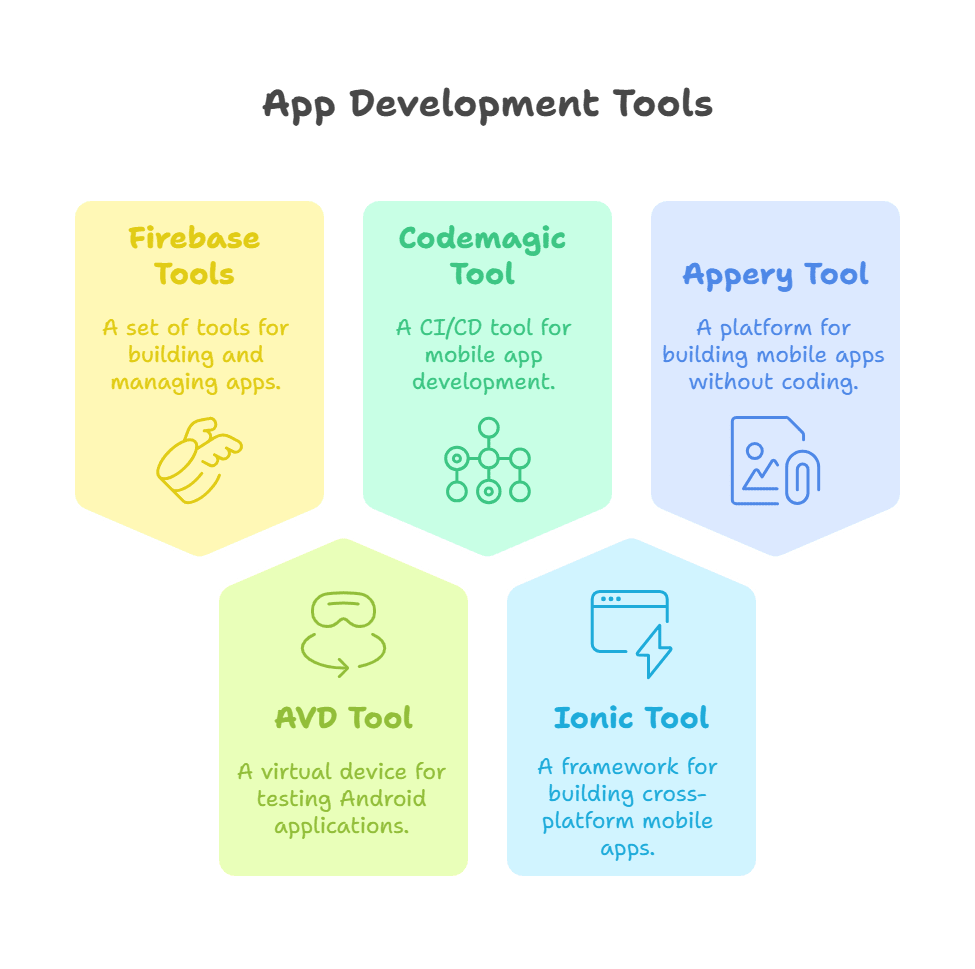
Top 5 Tools to Improve Your App Development Efficiency
You can supplement your adeptness in creating mind-blowing apps with the crucial tools discussed below. Your productivity and efficiency are bound to grow with them.
Below are the top 5 essential tools that can elevate your app development game:
1. Firebase Tools
These cutting-edge tools for accelerating and scaling app development are integrated into the Google-backed Firebase platform. The Google Cloud infrastructure powers them so your apps can reach the market quickly and at scale.
The key features of these mobile app development tools are:
- Ease of setting up of the backend without server management
- Prompt deployment of codes and assets in app projects
- Quick resolution of various problems related to app development
- Effortless scaling to support limitless users
- Offline data support to allow the app to function in offline mode
Here’s what you can do with these tools:
- Create Market-Ready Apps with Cloud Firestore: You can build secure and serverless apps at a mass scale with the Cloud Firestore tool. It helps you accomplish quick development due to its stellar features, like:
- Realtime Database: JSON data can be stored and synced between app users online or offline in real-time in a highly secure way, making your apps serverless.
- Remote Configuration: The user experience during app building can be controlled and optimized dynamically by setting up feature flags in prototype mode.
- Firebase Extensions: Open-source, pre-packaged codes help improve app functionality through seamless integration with the app’s architecture. This saves you from extensive coding and deployment hassles.
- App Security: There is a provision for validating the credentials of the source of incoming traffic. You can easily block abusive and irrelevant traffic.
- Secure Authentication: By adding end-to-end identity solutions, app users can be authenticated, signed in, and onboarded with minimum coding.
- Cloud Functions: You can script and run server-side app logic without setting up a server. The cloud infrastructure facilitates the transmission of messages across platforms between user devices and servers. As your app grows with a higher volume of user-generated content, the cloud seamlessly stores and serves the same.
- Hosting: Your apps are hosted on secure and quick-loading sites with global CDN.
- Machine Learning Features: Robust Firebase ML features facilitate the building of custom models and allow you to integrate your app with ready-to-deploy APIs.
2. AVD (Android Virtual Device) Tool
This emulator tool facilitates testing your Android apps on virtual devices with various configurations or specifications. By testing your app on different Android versions, you can streamline the Android app development process.
Here’s how you can level up your app development game with this tool:
- The AVD Tool emulates a wide range of Android devices, from smartphones and tablets to TVs, enabling comprehensive testing across different form factors.
- Hardware acceleration is supported, which facilitates quicker emulation and optimum performance.
- Easily configure AVDs to simulate various Android OS versions and API levels, allowing you to test your app’s compatibility and functionality across different Android environments.
- The tool is seamlessly integrated into the Android Software Development Kit (SDK) and is free, providing developers with a cost-effective solution for device testing and app optimization.
3. Codemagic Tool
This cloud-based CI/CD (Continuous Integration/Continuous Delivery) tool is used primarily for Flutter app development. Its workflow configurations and API offer versatility to teams building white-label apps.
The tool offers numerous advantages for developers looking to turbocharge the app-building process.
Here’s how Codemagic empowers developers to turbocharge the app-building process:
- Build, test, and deploy apps to stores like Google Play, and iOS App Store in automated mode.
- Trigger new builds by pushing code to the repository, a process that also adds tags and merges pull requests
- Enhance the development team’s efficiency by configuring multiple workflows for the app, distributing the most recent build for testing, or sending it to production for publishing.
- Connect it to your self-hosted or cloud-based repositories.
- Clone your source code to create a separate virtual machine instance, destroy it instantly after completing the build, and encrypt it.
- Configure application workflows to integrate with third-party services for testing app performance on actual devices, detecting vulnerabilities, and checking code quality
- Extend configurations with Python scripts or open-source codes to sign and publish codes and control versioning.
- Benefit from CLI tools, Android Studio, Xcode, and other pre-installed software that expedites app building
- Scale up the app-building process by adding extra concurrencies for parallel runs.
4. Ionic Tool
This HTML5-based development tool expedites the process of creating, testing, publishing, and monitoring cross-platform apps. You can leverage SASS, CSS, and HTML5 web technologies for building hybrid and interactive mobile apps. The preset JavaScript and CSS components come in handy.
You can utilize the Angular framework and integrate it with Ionic’s user interface library to streamline the development of cross-platform apps. The best thing is that it is open-source and customizable.
5. Appery Tool
Appery Tool, part of the Appery.io platform, is designed to simplify the creation of Progressive Web Apps (PWAs) and hybrid mobile applications. With its intuitive features, developers can leverage a code generator to build apps for Android, iOS, or Windows Phone with minimal coding effort.
The tool facilitates debugging and compatibility testing. The builder section offers tabs for model, storage, app settings, styles, templates, JavaScript, etc. to facilitate app development.
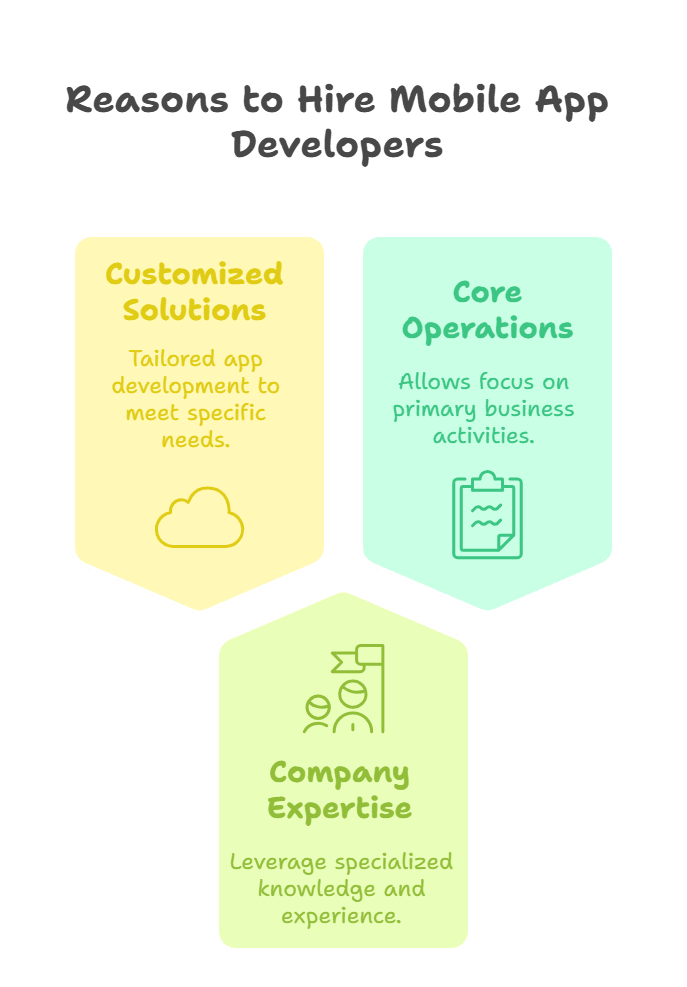
Looking to Make Better Apps? Key Reasons to Hire Top Mobile App Development Companies
First, hiring one of the top mobile app development companies will enable you to quickly outperform your competition.
In addition, top mobile app development companies bring a wealth of experience and expertise to the table. Their seasoned professionals understand the nuances of app development, ensuring a streamlined and efficient process from conception to deployment.
Let’s understand the benefits of partnering with a top mobile app development company:
1. Customized Mobile App Development Solutions
Mobile app development companies specifically tailor their mobile apps to your brand’s needs. Before moving on to the app construction phase, the development team analyzes your needs and researches consumer expectations and industry difficulties.
They guarantee that the recently created mobile application aligns with your brand’s voice and tone in this way, assisting it in taking the lead in the market.
2. Access to Company Expertise
Hiring one of the top mobile app developers will allow you to take advantage of their years of experience and skill in developing a superior mobile application for your company.
Here, the developers are knowledgeable about the most recent developments in the mobile app development sector and thoroughly understand the various app development methodologies. As a result, the app they create will undoubtedly satisfy your business needs.
3. Focus on Core Operations
You and your team may make better use of your valuable time by outsourcing the creation of your mobile app to the top mobile app development companies, freeing up time for other crucial business tasks.
It will increase the efficiency of your company and assist you in meeting your future expansion and brand goals. This way, you can focus on your core operations and strategic initiatives, such as product development, marketing strategies, customer acquisition, and enhancing overall business processes.
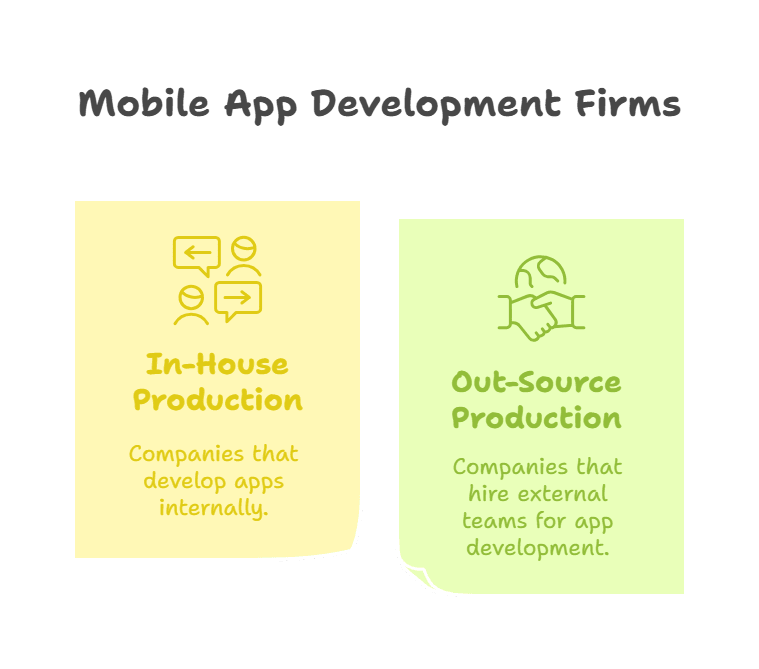
Types of Mobile App Development Firms
Primarily, there are two types of mobile app development companies in the market: big app development companies, independent freelancers, and tiny startups.
Both segments offer the capability to craft feature-rich mobile applications, yet they differ notably in their approach, technology stack, and pricing structure.
1. Companies Supporting In-House Production
Numerous businesses in the market handle every step of the process, including designing, creating, testing, and distributing apps. These businesses charge exorbitant fees, and the majority of the app development team members are company employees.
2. Companies Supporting Out-Source Production
These businesses provide more freedom than corporations that recruit specialists on an internal basis because they hire professionals on a freelance basis. They impose reasonable prices on the customers to ensure efficient use of resources and cost-effectiveness.
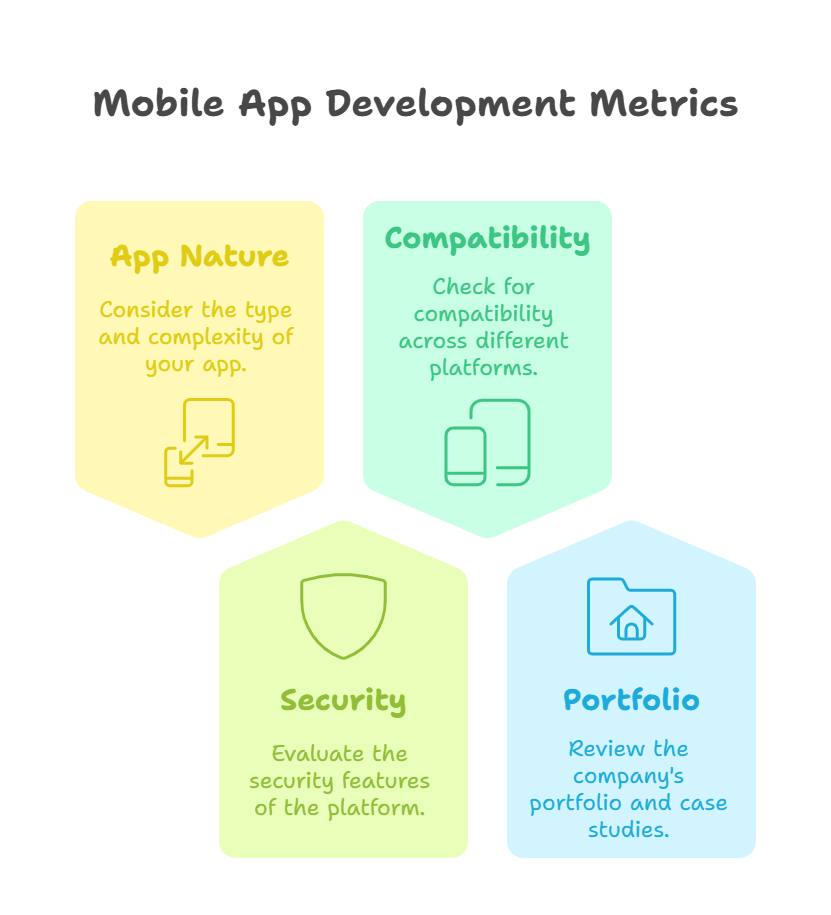
Metrics to Consider When Choosing the Top Mobile App Development Companies
The following list includes some of the most important metrics you should take into account when selecting a company to create your mobile app:
1. Nature and Complexity of Your App
You should always consider the main features of the mobile application you want to create and how it benefits users. In addition, it’s important to consider the devices and operating systems on which the app will run.
The fact that customers frequently switch displays or devices should be taken into consideration when investing in an app development company. As a result, the app needs to work with the most recent iterations and devices that use cutting-edge technology.
2. Platform Security
One of the most delicate topics for any firm that has yet to release its mobile applications is security. To keep you and your staff safe, your app needs to safeguard user data and information from outside intrusions.
The following list includes some of the usual yet important security aspects that you should check for in the products offered by a mobile app development company:
- Data Encryption
- Identity Authentication
- System Monitoring Features
- User Access
- Auditing
- Role-Based Access Control
3. Platform Compatibility and Diversity
Determine the target platforms for your app—iOS, Android, or cross-platform. Ensure that the development company has expertise in developing for your chosen platforms and can optimize the app’s performance across various devices and screen sizes.
4. Portfolio and Case Studies
Review the company’s portfolio and case studies of past projects. Evaluate their previous work’s quality, diversity, and relevance to gauge their creativity, design sensibility, and ability to deliver successful apps.
A portfolio assessment is necessary because of the company’s ability to create visually appealing apps and to ensure they have experience developing apps similar to yours. This demonstrates their understanding of your industry and target audience, increasing the likelihood of a successful collaboration.
Crucial Phases in Hiring Top Mobile App Development Companies
According to research, mobile app development market revenue is projected to reach $673.79 billion by 2027. This figure unmistakably shows how competitive the market’s various mobile app development companies are becoming.
Follow the step-by-step process below to navigate through the crucial phases of hiring one of the top mobile app development companies:
- Examine the technology and app development experience of the numerous mobile app development companies available in the market.
- Verify the mobile app development firm’s websites and portfolios
- Request insightful information from your professional and social networks.
- Analyze the sincere testimonials left by satisfied customers
- Compare the prices that two or more companies are offering
- Schedule an online meeting for a mobile app development company that fits your brand’s criteria.
- Let the mobile app development firm know about the project’s timeframe, budget, and scope.
- Request a product demo before hiring a mobile app development company.
- Clearly articulate your project requirements, including the app’s creation goals, target market, essential features, and any other pertinent information.
- Ensure the mobile app development firm understands your vision and objectives to deliver a tailored solution that meets your needs.
To Wrap Up
Building a superior mobile app requires planning, expertise, and skills. This is a long-term investment in the company’s business goals. Hence, teams can consider partnering with an experienced enterprise app development company to conceptualize and execute a superior product. This is a cost-effective, efficient approach to enterprise app development.
If your business is looking to develop a mobile app, consider partnering with Hurix Digital. From embracing cross-platform and hybrid development to leveraging the latest technologies, we offer expertise to help you overcome challenges and achieve your business objectives.
Contact us for more info!

Vice President & SBU Head –
Delivery at Hurix Technology, based in Mumbai. With extensive experience leading delivery and technology teams, he excels at scaling operations, optimizing workflows, and ensuring top-tier service quality. Ravi drives cross-functional collaboration to deliver robust digital learning solutions and client satisfaction

